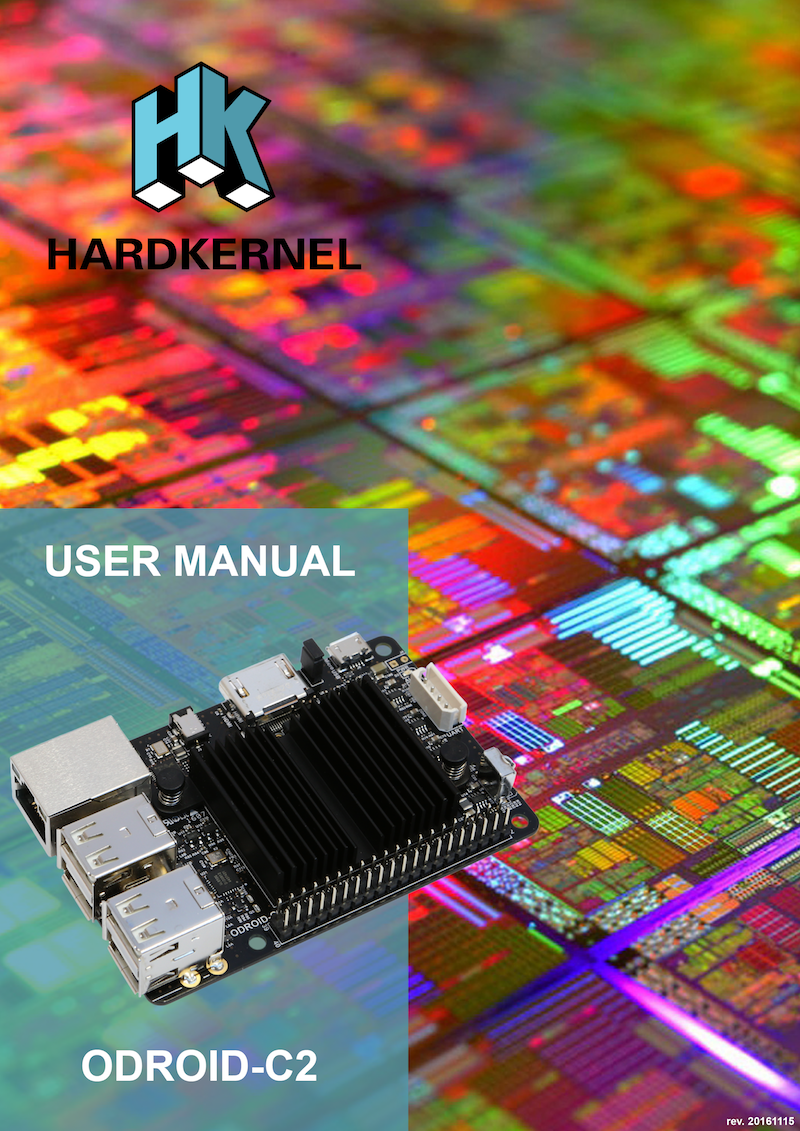
Click here to download the ODROID-C2 Manual PDF.
Congratulations on purchasing the ODROID-C2! It is one of the most powerful low-cost 64-bit Single Board Computers available, as well as being an extremely versatile device. Featuring a fast, quad-core AmLogic processor, advanced Mali GPU, and Gigabit Ethernet, it can function as a home theater set-top box, a general purpose computer for web browsing, gaming and socializing, a compact tool for college or office work, a prototyping device for hardware tinkering, a controller for home automation, a workstation for software development, and much more.
Some of the modern operating systems that run on the ODROID-C2 are Ubuntu, Android, and ARCH Linux, with thousands of free open-source software packages available. The ODROID-C2 is an ARM device, which is the most widely used architecture for mobile devices and embedded computing. The ARM processor’s small size, reduced complexity and low power consumption makes it very suitable for miniaturized devices such as wearables and embedded controllers.
Table of Contents
Chapter 1
1 Welcome
2 Differences between a typical PC and a Single Board Computer (SBC)
2 Components Included on an SBC
3 Block Diagram
3 Board Image
4 Attaching Peripherals
4 Power Supply
6 Monitor
6 Keyboard and Mouse
7 Ethernet and Wifi
8 MicroSD Card
7 eMMC Module
8 LED Status
9 Technical Specifications
13 Heatsink
13 Temperature Measurement
15 Frequently Asked Questions
Chapter 2
20 Getting Started
20 Home Computing Network
21 Preparing the Work Area
22 Flashing an Image
22 Boot Media
25 Windows 7+
28 Linux
29 OSX
30 Inserting the eMMC Module or SD Card
30 Powering Up
30 Troubleshooting
32 Configuring Linux
34 Configuring Android
35 Powering Down
Chapter 3
36 Operating Systems
36 Ubuntu/Debian
37 Linux Basics
38 Kernel
38 GUI
38 720p vs 1080p and 2160p
39 Progressive vs Interlaced Video
39 Video Downconversion
40 Video Upconversion
40 HDMI Overscan
41 Disabling Monitor Overscan
41 Display Setting Button on Remote Control
41 Finding Setting in Monitor Menus
42 Adjusting Linux Display Output
42 Adding an ODROID-VU7 Plus touchscreen
43 Command Line Interface
44 Disk Partitions
44 Web Browsing
45 Kodi (formerly XBMC)
46 Office and Productivity Applications
46 Music and MIDI
47 How do I Add a MIDI Interface to the C2?
48 Experimental Music with the C2
48 Android
48 Desktop Environment
49 ODROID Utility and Updater
49 Setting the Display Resolution
50 Kodi
50 Netflix
50 Gaming
50 Music and MIDI
51 Using Bluetooth Devices with Android
51 Adding an ODROID-VU7 Plus touchscreen
Chapter 4
52 Hardware Tinkering
52 Preparation
53 USB / UART Module Kit
58 Bluetooth Module 2
61 Tinkering Kit
64 ODUINO ONE
66 ODROID-SHOW2
68 16×2 LCD I/O Shield
69 Weather Board
71 USB-DC Plug Cable 2.5×0.8mm
71 USB-SPDIF
73 USB-CAM 720P
74 USB3/SATA3 HDD/SSD interface kit
77 USB3 to SATA Bridge Board
78 USB GPS Module
80 myAHRS+ board
82 WiFi Module 4
83 HiFi Shield+
84 RTC Shield
86 UPS3
87 Xprotolab Plain
88 ODROID-VuShell for ODROID-VU7
89 Universal Motion Joypad
90 Conclusion
90 Additional Resources
